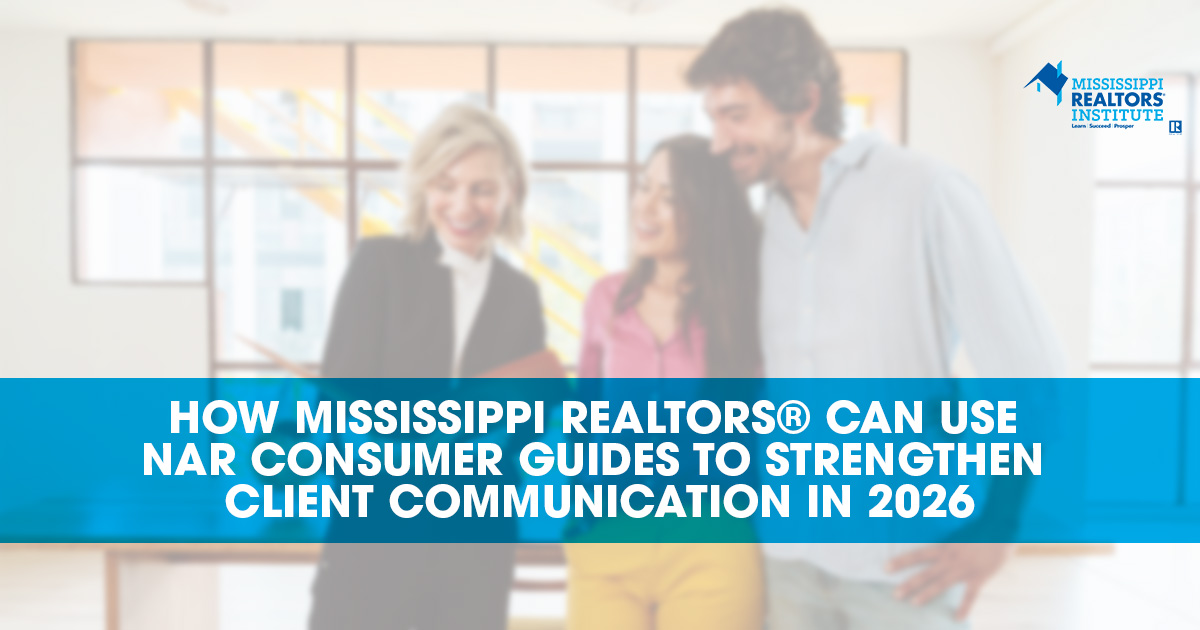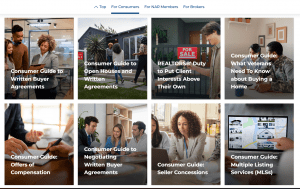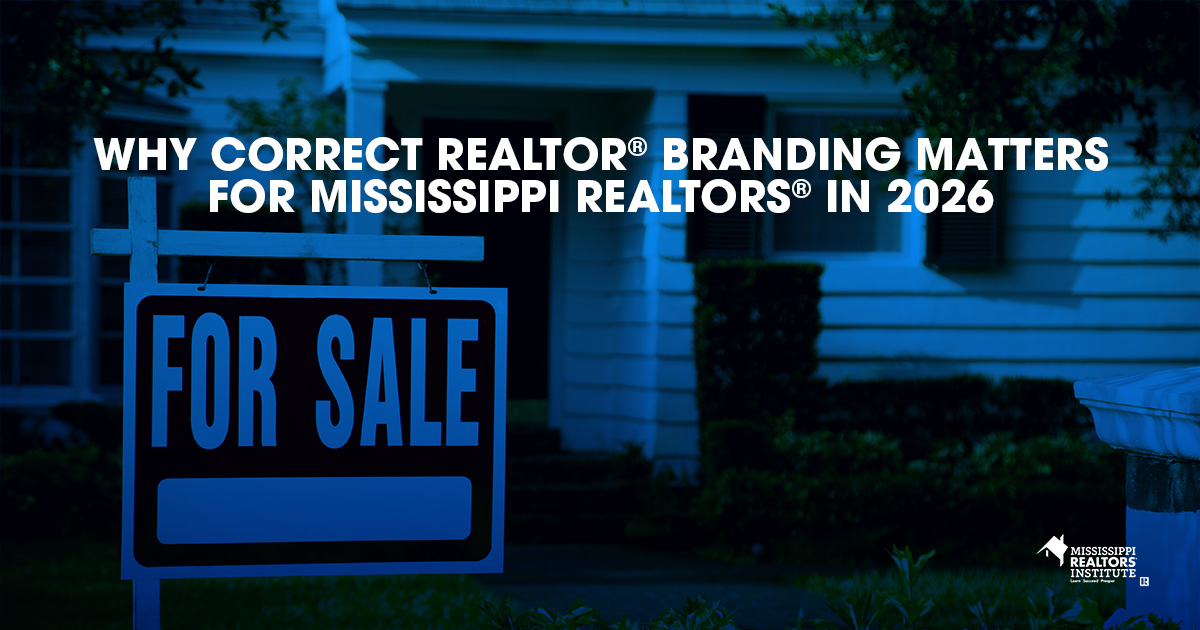Clear communication is one of the most valuable services REALTORS® provide to buyers and sellers. In today’s market, clients are more informed than ever—but they are also exposed to misinformation online. Mississippi REALTORS® who lead conversations with clarity and documentation are better positioned to build trust and prevent misunderstandings before they affect a transaction.
The Consumer Guide series developed by the National Association of REALTORS® provides professionally written, consumer-friendly resources that explain key real estate concepts such as written buyer agreements, appraisal gaps, closing costs, multiple-offer situations, and agency relationships.
When used strategically, these guides can enhance listing presentations, strengthen buyer consultations, and reinforce professionalism throughout 2026.
What Are NAR Consumer Guides and How Do REALTORS® Use Them?

NAR Consumer Guides are concise, plain-language resources designed to help REALTORS® explain important real estate topics clearly and consistently. Each guide focuses on a specific subject and outlines what buyers or sellers should understand before making decisions.
Topics include:
- Written buyer agreements
- Open houses
- Offers of compensation
- Multiple-offer scenarios
- Appraisal gaps
- Closing costs
- Preparing to buy or sell
These guides support transparent communication and align with the REALTOR® Code of Ethics by reinforcing accurate, non-misleading explanations.
How Mississippi REALTORS® Can Use Them
Mississippi REALTORS® can integrate Consumer Guides into their workflow in several practical ways:
- Provide a relevant guide during initial buyer or listing consultations
- Send the applicable PDF as a follow-up after discussing complex topics
- Include printed copies in listing packets or buyer folders
- Use the guide as a reference point during agency discussions
- Share educational posts tied to guide topics on social media
When clients both hear an explanation and receive a written resource, comprehension improves and expectations become clearer.

How Can REALTORS® Better Educate Buyers and Sellers in 2026?
In 2026, consumers expect responsiveness, documentation, and transparency— trends consistently reflected in national consumer research. Real estate professionals who proactively explain processes and provide written resources demonstrate both competence and professionalism.
Mississippi REALTORS® can elevate client education by:
- Explaining agency relationships early and clearly
- Discussing compensation structures before offers are written
- Reviewing contingencies and timelines in plain language
- Providing written resources to reinforce conversations
While NAR Consumer Guides provide a national foundation, REALTORS® must ensure those explanations reflect Mississippi license law and regulatory standards enforced by the Mississippi Real Estate Commission.
Ongoing professional education ensures that communication remains accurate, compliant, and aligned with current practice standards.
Can Mississippi REALTORS® Share NAR Consumer Guides With Clients?
Yes. NAR developed Consumer Guides specifically for REALTORS® to use in client communication.
Mississippi REALTORS® may:
- Download available English and Spanish versions
- Attach PDFs to post-consultation emails
- Incorporate them into digital marketing or drip campaigns
- Provide printed copies at open houses
- Reference guide content during listing presentations
Because these materials are created by the National Association of REALTORS®, they support consistent messaging and reinforce the professionalism associated with REALTOR® membership.
As with all communication tools, REALTORS® should ensure their use aligns with brokerage policies and Mississippi regulations.
How Do Consumer Guides Help Prevent Real Estate Misunderstandings?
Many transaction challenges stem from unclear expectations rather than disputes.
Common areas where misunderstandings occur include:
- Representation and agency obligations
- Compensation explanations
- Earnest money and escrow procedures
- Multiple-offer strategies
- Inspection and appraisal processes
- Closing cost responsibilities
Consumer Guides break these topics into straightforward explanations, helping clients understand what they are signing and why it matters.
For example:
- A guide on written buyer agreements clarifies representation and responsibilities.
- A guide addressing multiple offers sets realistic expectations in competitive markets.
- A guide explaining closing costs helps buyers prepare financially before closing day.
Clear, documented communication reduces uncertainty and supports ethical, transparent practice consistent with the REALTOR® Code of Ethics.
What Tools Can REALTORS® Use to Improve Client Communication?
Consumer Guides are most effective when incorporated into a broader communication strategy.
Mississippi REALTORS® can strengthen communication in 2026 by implementing:
1. A Structured Communication Plan
Blend text, email, phone, and in-person meetings based on client preference and transaction stage.
2. Transaction Timelines and Checklists
Mirror Consumer Guide topics with a step-by-step roadmap from contract to closing.
3. Proactive Education
Explain agency, compensation, and contingencies before time-sensitive decisions arise.
4. Continuing Education Focused on Communication and Compliance
Stay current on Mississippi regulations, disclosure requirements, and evolving best practices.
The Mississippi REALTORS® Institute supports licensees with pre-license education, post-license training, broker development, continuing education, and Code of Ethics courses designed specifically for Mississippi’s legal and market environment.
Why Strengthening Client Communication Matters in 2026
Professionalism in today’s real estate market requires clarity as much as negotiation skill.
Mississippi REALTORS® who prioritize structured, transparent communication:
- Build stronger client trust
- Reduce transaction friction
- Minimize misunderstandings
- Demonstrate ethical commitment
- Differentiate themselves in competitive markets
NAR Consumer Guides offer a consistent framework for explaining complex topics clearly. When paired with Mississippi-specific education and ongoing professional development, they become a powerful tool for elevating client service.
These outcomes are strengthened when REALTORS® commit to ongoing professional development tailored to Mississippi’s regulatory and market environment.
Elevating Professional Standards Through Clear Communication
The Mississippi REALTORS® Institute equips Mississippi REALTORS® with high-quality education, nationally recognized certifications, and continuing education programs designed to strengthen communication, compliance, and professionalism in today’s evolving real estate environment.
To explore continuing education courses, Code of Ethics training, and other professional development resources, visit realtorinstitute.org or contact the Mississippi REALTORS® Institute at 601-932-5241—your partner in advancing professional excellence across Mississippi.



